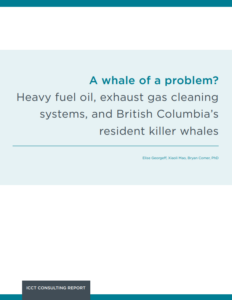According to a new study commissioned by WWF-Canada, 30 scrubber-equipped ships dumped nearly 35 million tonnes of washwater effluent off the BC coast in 2017. The report highlights that these harmful discharges put killer whales and other species at risk, with cruise ships being responsible for 90% of these discharges.
Open-loop scrubbers were used by 50% of ships in the study. The others used ‘hybrid’ systems, which enable ship operators to control when discharge is released by storing it temporarily. As of now, federal laws do not prohibit ships from functioning in ‘open mode’ in Canadian waters.
[smlsubform prepend=”GET THE SAFETY4SEA IN YOUR INBOX!” showname=false emailtxt=”” emailholder=”Enter your email address” showsubmit=true submittxt=”Submit” jsthanks=false thankyou=”Thank you for subscribing to our mailing list”]
The report also states that these scrubber discharges could increase by 35% in 2020 as more ships begin using scrubbers to comply with new IMO sulphur rules. Specifically, cruise ships could account for two-thirds of this increase.
WWF-Canada recommended to eliminate the use of open-loop scrubbers and/or discharge from hybrid scrubbers in Canadian waters, and more specifically in marine protected areas, as well as critical habitats. To achieve this, a transition away from HFO to fuels that do not need scrubbers is necessary, which will also set a course for zero-emission shipping by 2050.
Andrew Dumbrille, senior specialist of sustainable shipping with WWF-Canada, stated on the occasion:
Canada has a responsibility to safeguard our oceans. Washwater discharges from open-loop scrubbers pollute habitat and negatively affect wildlife, and an HFO spill would be devastating to coastal communities
In addition, Hussein Alidina, lead specialist of oceans with WWF-Canada, noted that southern resident killer whales in BC are under an enormous amount of stress, while washwater effluents may be degrading their critical habitat. For this reason, pollution and contamination from all sources, including shipping, must be reduced for long-term recovery of this population to be possible.
See more information in the following report





























































